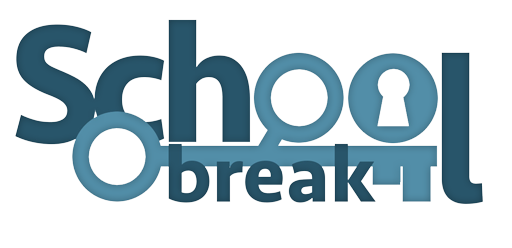School Break (SB) aims to explore the possibilities of school students learning through playing and designing escape room game
type educational experiences. The title ‘School Break’ thus plays with the two meanings of ‘break’, i.e. escape and recreation/play.
Escape rooms are a relatively new entertainment form in which small groups of players work together over a set time (usually an
hour) to solve puzzles and escape a real life locked room. There is increasing interest in their pedagogic use as they provide an
authentic, motivating activating context for problem-solving, support small group collaboration, and let participants learn through
exploration and experimentation. As well as supporting the development of cross-curricular skills – such as problem-solving,
teamwork, and lateral thinking, which are also the focus of different EU education policies (cf. e.g. “Key Competences for Lifelong
learning” or “Improving Competences for the 21st Century”) – escape rooms can also be designed to meet specific curriculum goals.
This project makes the assumptions that collaborative problem-solving and design supports teamwork, communication skills, and
creativity, while the playful and open-ended nature of the task, in a safe space supports measured risk-taking, creativity and
innovation.
We hypothesise that playing and designing escape rooms will achieve three objectives: 1) increased student engagement; 2)
learning discipline-specific knowledge; and 3) developing connected cross-curricula skills, in particular problem-solving, teamwork,
and creativity.
One way to use escape rooms in an educational manner is to design escape rooms, i.e. in classrooms or school buildings, in a kind of
physical metaphor with the help of boxes and locks, or with different amounts of ICT support, to teach a certain topic that is built
into the pertinent narrative, tasks, riddles, puzzles etc. of that escape room. An alternative approach to students learning through
playing escape rooms, is enabling students to learn by developing their own rooms, which involves a rich challenge, bringing
together creative, problem-solving, and technical design skills in a safe space, where the outcome does not really matter (although
the process may be assessed). Designing escape rooms is necessarily iterative and it will be impossible to create a perfect room first
time; therefore learning from failure is an inevitable part of the process. Only repeated testing of puzzles and their integration in
practice will lead to a workable room. This creates a cycle of productive failure and continuous improvement.
We will take a three-phase approach to design and development, first developing a conceptual framework for teachers and
exemplar escape rooms to be used off-the-shelf; then developing teachers’ manuals so they can develop and test their own escape
rooms to create specific escape rooms over specific areas of curriculum content (IO1 and 2) , and third guide, support and document
an escape room use and particularly the design process where students learn through using and creating escape rooms (IO3).
The project will mainly take place in secondary schools, potentially including young people aged 10-18. Each partner will focus on a
subject area (and if adequate different age ranges), including: citizenship and economics education (PHFR), maths and computing
(MMU), life skills, e.g. cultural awareness and (social) entrepreneurship (AdM), geography and environmental issues (LIT), arts and
media (UOC), and digital literacy (SUPSI). (The detailed distribution also depends on the funding of SUPSI.)
To meet the above mentioned priorities and the main objectives of our project (developing methodological skills among teachers
and developing a set of escape room experiences for school student in different subjects), School Break will involve a tripartite set of
direct and indirect target groups: a) teachers and student teachers; b) school students; c) people and institutions supporting
methodological development in educational environments (volunteers, trainers, teacher trainers, academic developers, researchers,
thought leaders).
The transnational approach is based on country-specific educational perspectives on game-based learning, e.g. concerning (subject
specific) school didactics, and the the educational usage of escape rooms allows for a specific transfer of expertise. The recognition
of game-based learning is different from country to country. Accordingly, while there is a growing body of research that playing and
designing escape rooms has a range of benefits for learning, this research does not take cultural contexts or implications into
account: for example, attitudes to failure, rules, collaboration. Therefore a transnational project is essential to developing a
framework that reflects these cultural differences into account and makes it suitable across nationalities.


